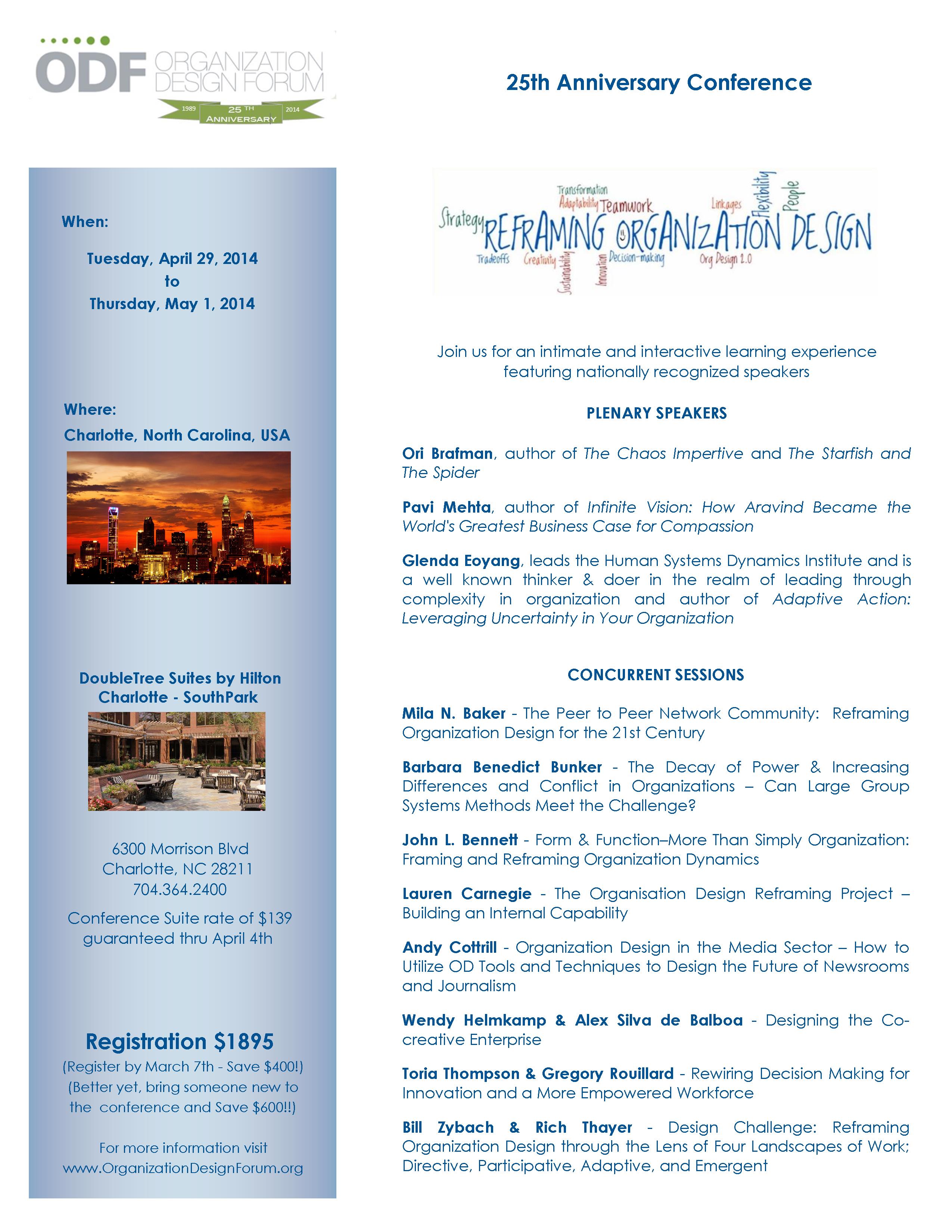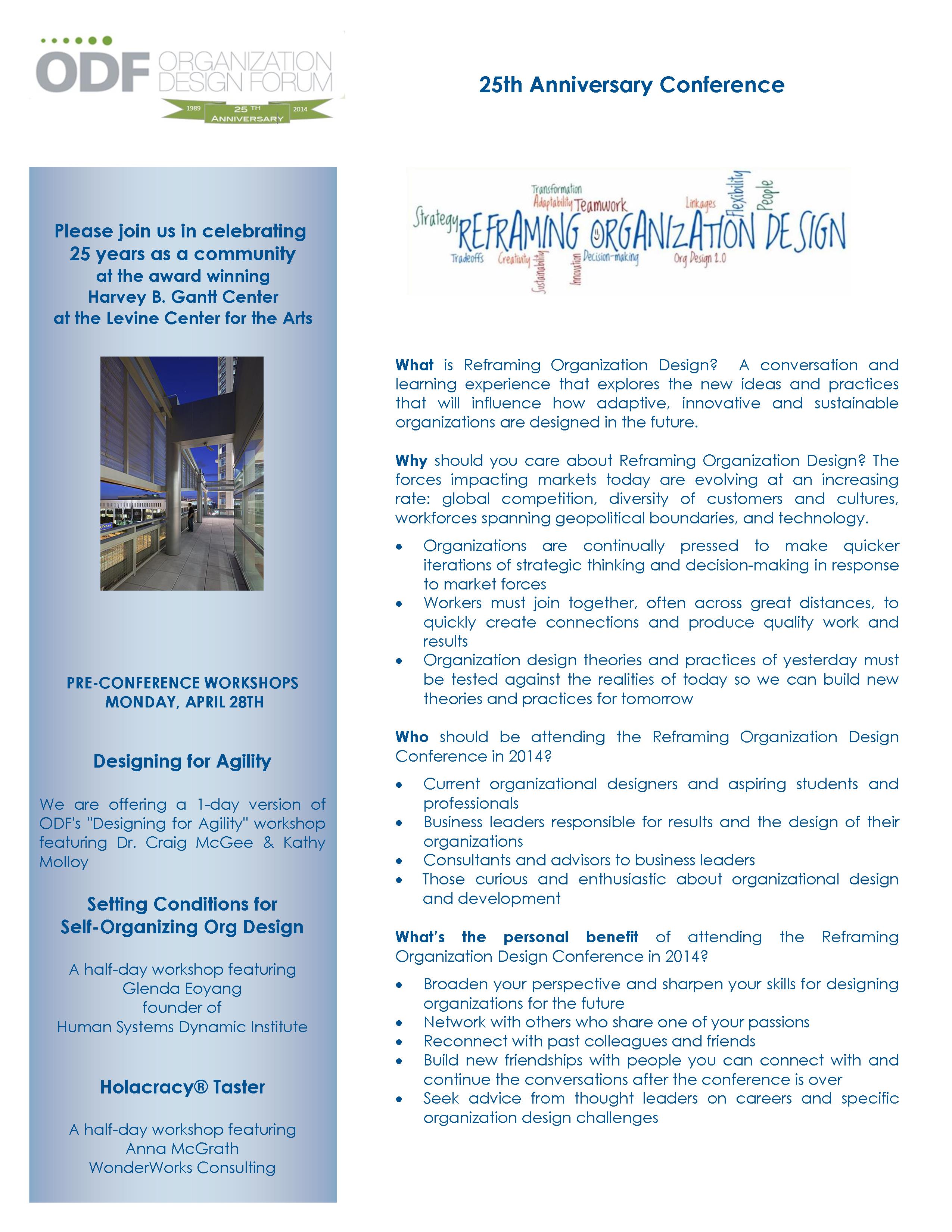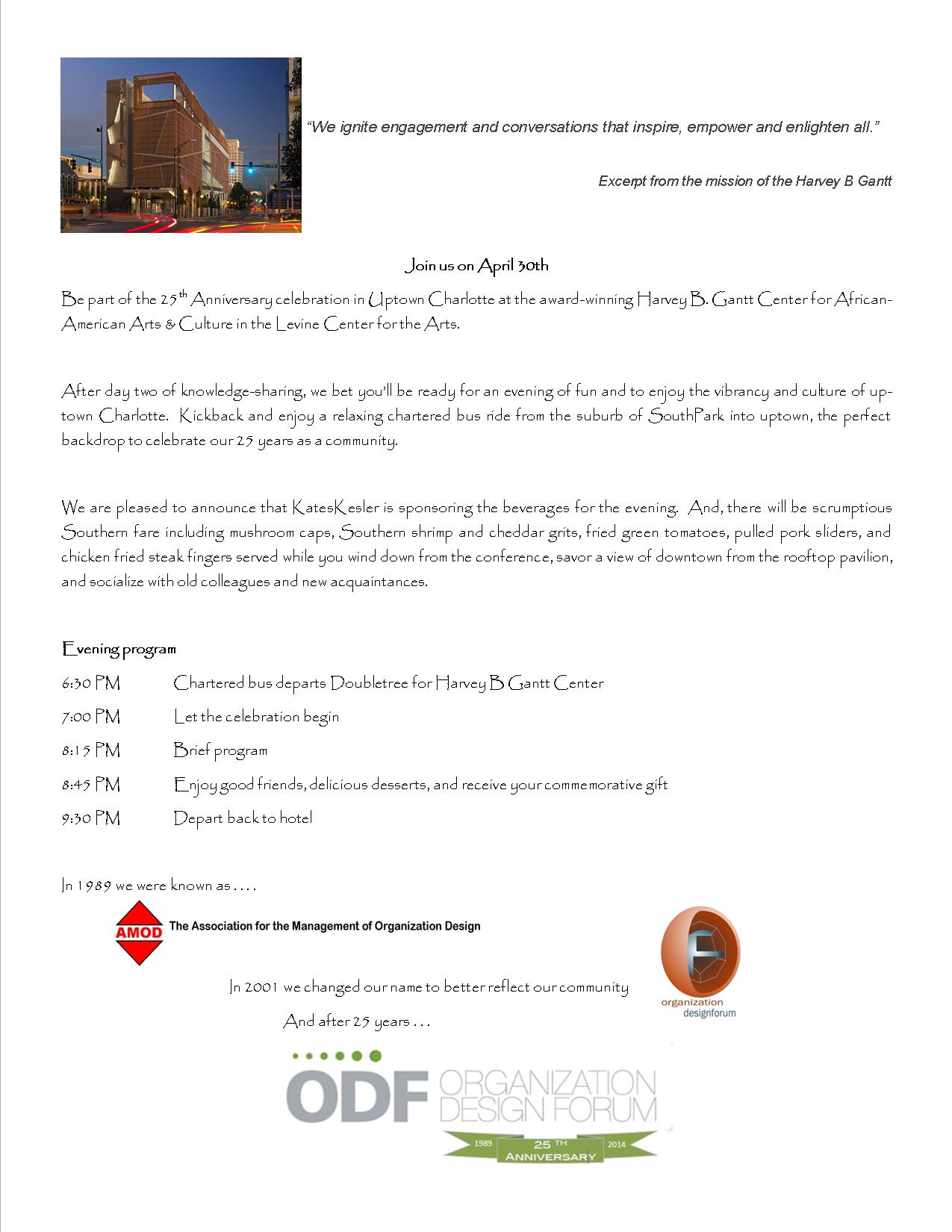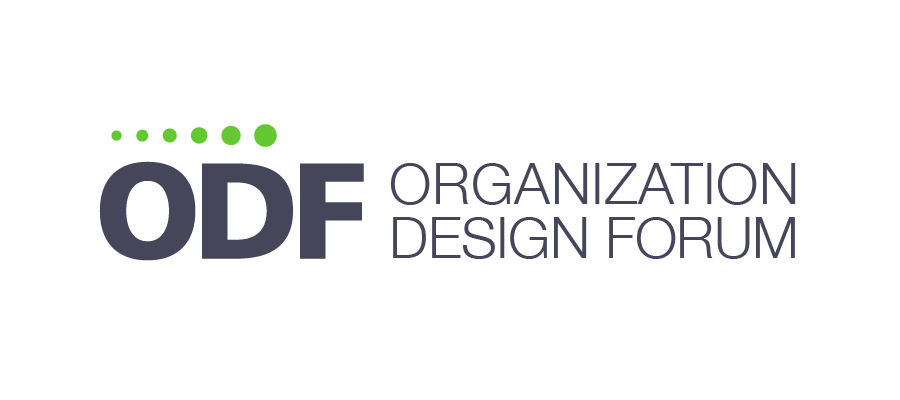[tab:Photo Collages]
Who were our “knowledge-sharers”?
Who joined us?
Getting to know the community members. . .

We celebrated ODF’s 25th Anniversary (1989 – 2014) in style!

We toasted Jay Galbraith
[tab:2014 Conference]
ODF’s 2014 Annual Conference
Charlotte, NC, USA
April 29 – May 1, 2014
Click Here to Register!
Registration $1895
Student rate is $495
Bring someone new to ODF and you can both save $600 – Register for $1295
Click here for online hotel reservations at Doubletree – SouthPark
For travel plans, we will start at 8:30 AM on Tuesday and wrap up around 4:30 on Thursday

 Click here for Brochure (.pdf)
Click here for Brochure (.pdf)
Click here for the Reframing Organization Design Conference Agenda
[tab:Plenary Speakers]
2014 Conference “Reframing Organization Design”
Plenary speakers include:
Ori Brafman 
Ori will discuss his latest book, THE CHAOS IMPERATIVE: How Chance and Disruption Increase Innovation, Effectiveness, and Success which reveals how even the best and most efficient organizations, from Fortune 500 companies to today’s US Army, benefit from allowing a little unstructured space and disruption into their planning and decision-making.
New York Times bestselling author Ori Brafman specializes in new ways of looking at business. Following his bestsellers Click: The Magic of Instant Connections, The Starfish and the Spider: The Unstoppable Power of Leaderless Organizations and Sway: The Irresistible Pull of Irrational Behavior, his latest book The Chaos Imperative: How Chance and Disruption Increase Innovation, Effectiveness, and Success is an insightful exploration as to how organizations can drive growth and profits by allowing contained chaos and disruption to flourish, generating new ideas that trigger innovation.
Ori Brafman has been a lifelong entrepreneur in business, government, and the nonprofit sector. For the past two years, Brafman has worked closely with perhaps the biggest and most hierarchical organization of them all, the US Army, to develop an innovative training program.
He has presented before audiences at Google, Cisco, Microsoft, Amazon, Televisa, Stanford Business School, Harvard Business School, and many others, and has written for Business Week, the New York Times international edition, and Fortune magazine. Brafman has appeared in the New York Times, CNN, ABC News, BBC, National Public Radio, Wall Street Journal, Fox News, CSPAN, Fortune, and Fast Company.
Glenda Eoyang, PhD 
Glenda’s presentation Radical Reframe: Organization Design as an Infinite Game will discuss:Reframing the old game of organization design isn’t an option any more, it is a necessity. Speed of change, massive interdependencies, unpredictable diversity, unavoidable uncertainty, and shifting resources challenge our assumptions. These conditions change the rules for the game of organization design. As individuals and as a profession, our driving question must be: What will the new game of OD look like, and how can we prepare ourselves to play it? During this session, simple distinctions and deep reflection will lead you to:
- See this complex new game as it emerges,
- Understand how your current practice hits and misses the mark, and
- Explore options for action to play—and win—the infinite game of organization design in the future.
Dr. Eoyang works with public and private organizations to help them thrive in the face of overwhelming complexity and uncertainty. She is a pioneer in the field of human systems dynamics (HSD), which she founded. Through Human Systems Dynamic Institute, Glenda uses her models and methods to help others see patterns in the chaos that surrounds them, understand the patterns in simple and powerful ways, and take practical steps to shift chaos into order. Her clients include 3M, Merrill Lynch, Cargill, The United Methodist Church, Target Stores, W. K. Kellogg Foundation, McKnight Foundation, Gates Foundation, REXlab, Prevention Institute, social service and high-techstart-ups, and numerous local, state, and federal government agencies.
Glenda’s latest book, with co-author Royce Holladay, is Adaptive Action: Leveraging Uncertainty in Your Organization (Stanford University Press, April 2013).
Pavi Mehta 
Pavithra K. Mehta is drawn to the edges where storytelling, spirit and social change meet. Her award-winning documentary Infinite Vision followed the life and work of the visionary surgeon Dr. V — a legend in the field of social entrepreneurship. Her book Infinite Vision: How Aravind Became the World’s Greatest Business Case for Compassion was a 2012 finalist for the Academy of Management’s Book of the Year Award. Pavithra currently serves on the board of the Aravind Eye Foundation as well as Service Space, an incubator of gift-economy projects designed to ignite more love and compassionate action in the world. She co-leads its inspiring news portal, DailyGood, as well as its pay-it-forward restaurant, Karma Kitchen, in Berkeley. Most recently she helped launch a 21-day Gratitude Challenge that culminated on Thanksgiving last year with over 11,000 participants from over 118 countries.
CONCURRENT SESSIONS
The Peer to Peer Network Community: Reframing Organization Design for the 21st Century | by Mila N. Baker, Ph.D., Academic Chair, M.S. Human Resource Management & Organization Development Organization: New York University – SCPS
This session will introduce participants to a new framework for organization design – the peer to peer network community architecture which adapts the basic concept behind computer and social networking and crowdsourcing to organizational design and leadership. The new architecture framework demonstrates that a network with “equipotent” nodes of power-think peer leaders are infinitely more powerful than “client-server” (i.e. leader-follower) networks. Yet the typical work space and organizational design methods still harkens back to the days of punch-card computers. Companies such as Gore, Blackrock, and Herman Miller practice these principles and have achieved long-term success. Baker provides a structure to this approach and design.
+ + + + + + + + + +
The Decay of Power & Increasing Differences and Conflict in Organizations – Can Large Group Systems Methods Meet the Challenge? | by Barbara Benedict Bunker, Professor of Psychology Emerita and Independent OD consultant
How do new organization realities impact our change strategies? In this world of rising expectations but diverse interests, we can expect more differences and more conflict. What large group methods can help organizations be flexible, inclusive and manage diverse interests?
Objectives:
- To present a challenging point of view about power in today’s organizations and world (Naim)
- To share experiences that confirm or disconfirm these ideas
- To Describe innovations in the Open Space and World Café communities and to contrast these with other large group methods that take more time
- To describe how some large group methods deal with differences by managing conflict instead of trying to resolve it
- To consider how to use them more effectively in organization design
+ + + + + + + + + +
Form & Function–More Than Simply Organization: Framing and Reframing Organization Dynamics | by John L. Bennett, PhD, Assoc. Professor at McColl School of Business, Queens University of Charlotte
Come on! Get up! Let’s Move! The dynamic nature of organizations prompts designs and re-designs resulting in change at many levels. This transformation prompts both intended and unintended consequences. In this experientially based session, participants will be asked to experience various organization configurations at the individual, team, and organization levels as a way to explore the human and functional impacts of these changes. This will provide rich opportunities to discover and explore perspectives, link theory to practice and practice to theory.
Objectives:
- Gain awareness of the human and functional impacts of organizational configurations at the individual, team and organization levels
- Theoretical concepts related to interpersonal, group, and system interaction prompted by design and configurations
- Demonstrate and learn about the complexity/simplicity and adaptability/rigidity of organizations
- Develop reflective practice skills
+ + + + + + + + + +
The Organisation Design Reframing Project – Building an Internal Capability | by Lauren_Carnegie, Change and Organization Design Consultant at Transport Accident Commission, Australia
Every organisation design practitioner will be able to remember the time when they didn’t even know what organisation design was let alone what it looked like in practice. For this presenter, it was an enquiring email that opened her eyes to the adaptive world of organisation design. This session reflects on a 12 month project to reframe organisation design and build internal organisation design capability.
Objectives:
- To share why an Australian organisation saw it as important to reframe organisation design and build internal capability
- to explore how a simple and practical approach to organisation design was co-designed to build internal capability (the outputs of this process will be shared with session attendees)
- to reflect on lessons learnt and business outcomes achieved so far
+ + + + + + + + + +
Organization Design in the Media Sector – How to Utilize OD Tools and Techniques to Design the Future of Newsrooms and Journalism | by Andy Cottrill, Managing Director
The Media sector is being disrupted like no other – where the old rules no longer apply. It is a great test-bed for new Org Design techniques and for ‘refreshing’ our tried and tested frameworks to work in a digital, multi-platform future.
Objectives:
- Give participants a flavor of the organizational trends affecting newsrooms and media companies, and the brands that they see every day
- Articulate how language and ‘jargon’ can create huge barriers to success in OD work – and suggest ways to bring these concepts to life in a way non-OD specialists can understand and relate to.
- Engage the audience in an open forum about how we can use our existing OD skills and knowledge to solve these organizational challenges, and what the gaps are? What does OD as a discipline need to develop?
+ + + + + + + + + +
Designing the Co-Creative Enterprise | Wendy Helmkamp, Partner & Alex Silva deBalboa, Director at The Clarion Group
In this era where consumers are mobile, connected, global, and demanding, the fundamental assumptions upon which many organizations have been built is being challenged. Businesses that have historically succeeded around the notion of predictability, standardization and a “build-it and they will come” mentality are struggling to cope with the rapidly changing dynamics swirling around them.
Value Co-Creation (VCC), is an emerging business paradigm that recognizes the untapped power and promise of the intelligence, creativity and skill residing outside of the enterprise. As Bill Joy, Founder of Sun Microsystems once stated “No matter how many smart people you have in your organization, just remember there are a lot more smart people outside your organization.” In practice, value co-creation occurs on engagement platforms (digital and physical) and involves a wide spectrum of stakeholder interactions, resulting in a variety of valued outcomes. The focus of the enterprise shifts away from “what” and “how” a product/service should be delivered (firm-centric mindset) to “who” it must engage, internally or externally, to create mutually beneficial experiences and value. The challenge remains to re-design the organization to maximize its co-creative potential.
In this session we will engage with you in a way that allows you to experience the paradigm shift value co-creation represents, while exploring the far reaching implications we see for organizational design across the enterprise.
More specifically, we will:
- Share leading edge VCC thinking and principles and explore the implications for organization design
- Allow you to experience the benefits of value co-creation through the design of the session both before and during the concurrent
- Provide and co-create frameworks, tools, and resources that you can use in your own design work
+ + + + + + + + + +
Rewiring Decision Making for Innovation and a More Empowered Workforce | by Toria Thompson & Gregory_Rouillard, Consultants at Storm Integrated Solutions
In this session, we offer an embodied experience of the organizational benefits and challenges of implementing Sociocratic consent decision-making. We also illustrate how a Sociocratic structure can be overlaid on an existing hierarchical organization, leveraging the strengths of both structures to achieve more effective outcomes.
Objectives:
- Provide an experiential introduction to a relatively new method of organizational design called Sociocracy
- Illuminate the often unnoticed negative impacts of traditional decision making rules such as majority, consensus, autocratic and “default”
- Provide an embodied experience of an effective decision-making method that cultivates innovation, participation and inclusion
- Offer a fun, energizing experience to all participants
+ + + + + + + + + +
Design Challenge; Reframing Organization Design through the Lens of Four Landscapes of Work; Directive, Participative, Adaptive, and Emergent | by Bill Zybach & Rich Thayer, Principles at ZTC Consulting
Come to contribute, learn, and engage as our design community continues its serious play with reframing design! Though many consultants have their favored approaches to design, this workshop suggests that to be successful in our transformation efforts, we must set aside our bias and look at each client system through four distinct cultural lenses. Only then can we begin to design adaptive transformations grounded in the “paradoxical theory of change” rather than consultant preferences or client fantasies. After a brief introduction to the Four Landscapes framework, we will tap into the intelligence in the room and conduct a Design Challenge that disrupts the traditional “one-size-fits-all” approach, and creates design solutions that are nuanced to fit each of the four predominant business cultures found globally today; Directive, Participative, Adaptive, and Emergent.
[tab:PreConference Workshops]Pre-Conference Workshops
Designing for Agility™: A 7-Step Model
Monday, April 28, 2014 | 8:30 AM – 5 PM
Regardless of your industry and strategy, our organizations need agility in order to shift and advance in global markets. What does your organization need to be more agile and how can you embed agility in your design work? This workshop takes a “whole system” approach, positioning you with a sound strategic foundation for designing the right structures, work processes, and human capital systems for an effective culture and enduring results.
Craig McGee and Kathy Molloy will be offering a condensed 1-day version of ODF’s “Designing for Agility” workshop.
If you would like some background information on course content, here is a white paper, Getting Results Thru Organization Design, by the facilitators. The workshop offers guidance on the 7-Step Model approach and how to determine which design is right for your company, and how to avoid the common problem of outmoded organization designs. Case examples from several companies are provided.
$495 Registration fee (students $250)
Setting Conditions for Self-Organizing Organization Design
Monday, April 28, 2014 | 1:30 PM – 4:45 PM
The discipline of human systems dynamics begins with the assumption that ALL human systems self-organize, all the time. The role of the OD professional (or anyone for that matter) is to set conditions that influence how the self-organizing process evolves.
Glenda Eoyang will be facilitating a half-day session in which you will:
- Recognize self-organizing dynamics in organizations as complex adaptive systems
- Learn the three conditions that influence self-organizing in human systems
- Explore how your OD practice influences those conditions (or not)
- Practice observing, analyzing, and influencing conditions to shift self-organizing dynamics toward greater health and productivity
$149 Registration fee
Holacracy® Taster Half-Day Workshop
Monday, April 28, 2014 | 8:30 AM – 12:30 PM
Is your organization agile and adaptive to its environment – even as it scales? Are the roles within your organization clear, yet also continually evolving, and driven by those doing the work? Is the work aligned with your organization’s purpose, without egos getting in the way? Holacracy® is a way to embed conscious practices into all aspects of your organization.
Anna McGrath, the first USA Licensed Provider of Holacracy™, will present this interactive half day workshop to introduce Holacracy® : a real-world tested “social technology” for structuring, governing, and running a purpose-driven, agile company. Holacracy® fundamentally changes how decisions are made and how power is distributed.
WonderWorks offer’s you their extensive experience in how to implement Holacracy into your organization, creating the least amount of disruption for your people, stakeholders and business. We have developed Holacracy training aids, app’s and modules to support our clients in a variety of industries including; Tech, Finance, Retail and Manufacturing to get the very best out of Holacracy.
This experiential introduction to Holacracy® includes ample Q & A and dialogue time.
In this training, participants will:
- Experience a transformative governance process that creates crystal clear roles and accountabilities, while dynamically evolving as-needed
- Experience Holacracy’s lightning-quick, action-focused Tactical Meetings
- Connect the dots to see Holacracy’s end-to-end approach to move from aim to action, and how it grounds an abstract purpose in concrete next-actions
- Interactively explore Holacracy’s self-organizing structure and double-linking paradigm, and learn how it scales across organizations
$149 Registration fee
 You can RSVP while registering, or please email ODF’s Administrator (info@organizationdesignforum.org)
You can RSVP while registering, or please email ODF’s Administrator (info@organizationdesignforum.org)
2014 ODF Conference & PreConference Admission and Cancellation Policies
- The Organization Design Forum (ODF) seeks to register all interested registrants to its conference and pre-conference sessions. Nevertheless, ODF reserves the right to deny registration to any individual because of space/capacity considerations or for any other reason.
- Cancellations of individual conference or pre-conference registrations made anytime up to March 29, 2014 will be refunded subject to a $300 cancellation fee.
- Cancellations made after March 29, 2014 or no-shows are subject to the full registration fee. Substitutions can be made at any time at no additional charge.
- Cancellations and substitutions will be accepted by phone (602.510.9105), fax (866.475.7002) or e-mail (info@organizationdesignforum.org)
- ODF reserves the right to cancel or reschedule this event, in whole or part. Please be advised that ODF is unable to assume responsibility for any airfare penalties, travel, or hotel charges that may be incurred due to sold out, canceled, or rescheduled events.
- Sleeping Room rate of $139 guaranteed thru April 4, 2014.
[tab:END]









